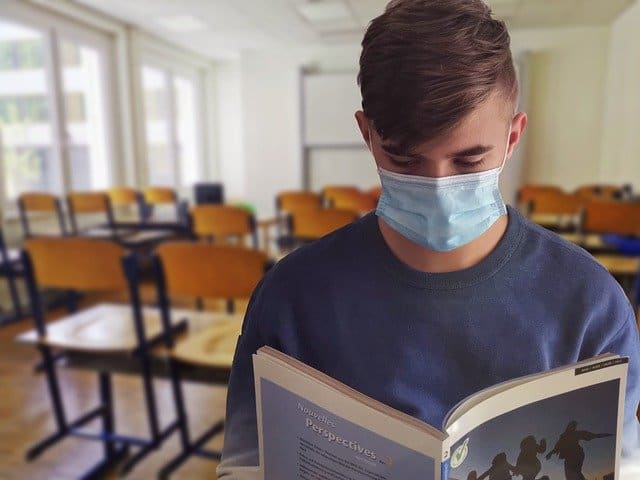
Walking down its high street, one might conclude that Broadstairs’ entire economy is founded on teaching English to foreign students. Broadstairs is all cafes. Cafes rely on foreign students; foreign students rely on host families, who also rely on foreign students. And Covid has ruined everything for the lot of them.
Tricky to estimate how much financial gain ELT (English language training) brings to Thanet, but those prominent “KSE vouchers welcome here” signs in the doors of every other business give you some idea how important students are to our local economy. And not only the eateries, chip shops and pubs rely on the students, but obviously the teachers also, as well as the many admin staff that support them. Nationally it’s believed ELT teaching contributes around £1.4 billion a year to the economy; in Thanet, around £33.6 million. We are a deprived area. That’s a lot of cash.
Many of the host families who take in students will be on the breadline and already taken a huge blow from Covid – you tend not to suffer strangers in your home if you don’t need the money. These are often people languishing on furlough pay, to whom each penny counts. My mum took in foreign students when I was a child. I remember watching in astonishment as French girls dipped sausages in their coffee, Japanese girls sat on the floor to drink tea. Some of them are still in touch.
See, it’s not just money ELT students bring to our community. They bring cultural value too. We all benefit from meeting people from other parts of the world. If you take a week’s holiday in Spain you tend to do it in a touristy bubble, meeting waiters and hotel staff that speak good English and slap on smiles. but having real people living their lives in your town, quarrelling, learning, loving, exploring, makes you see the world from a different perspective. Discovering you can thrive in a different environment, among people who are intriguingly different from you, improves your confidence and allows you to examine the world from a fresh perspective – but more crucially, it also makes you fully appreciate how much we all have in common.
The students who are taught here tend to retain a fuzzy glow of nostalgia for Britain all their lives. Plenty return to Thanet decade after decade. We are training the future leaders, politicians and business owners, and having them think kindly of us will help us is surely valuable for future trade relations.
But Covid has destroyed all this, of course. Travel is all but impossible; what would all the “support bubble” rules mean if you took three students into your home for a fortnight? Rules around quarantine and travel change every damn day: there’s too much uncertainty for anyone to feel confident about booking a trip, and even if the students feel gung ho about their health and chances, their parents, who pay, do not.
Language schools are suffering horribly. Many fear they cannot survive. That’s horrible news for all of us. And yet the issue has barely been raised in the media or in parliament; and indeed, when there was a debate on the issue in the House of Commons this July, our two MPS didn’t trouble to speak. They can’t pretend not to know how language schools are suffering. Plenty of my pals are ELT teachers; they wrote in huge numbers to tell them.
These are viable businesses, whose profits have been increasing year on year. They just can’t be profitable this year. But the Jobs Support Scheme, announced last week, will only support businesses and jobs that are currently viable. That means that employees must work at least a third of their hours and be paid accordingly by their employers; the government and employer will then pay a third each of the remaining hours not worked. Unfortunately, plenty of language schools cannot offer a third of their usual hours, because there are barely any students.
If they are allowed to collapse, if the teachers are allowed to abandon their professions and seek alternative employment, and the buildings and infrastructure that support this industry sold on and allowed to unravel, then when Covid clears off we will have to rebuild from scratch, and it will take years, if indeed, it’s even possible.
Many teachers say they just want to know what’s going on. It’s the uncertainty that kills. If language schools are to be allowed to go bankrupt, if teachers are to be allowed to lose their jobs, so be it: they can start rebuilding and retraining, reconciling themselves to a new and uncertain future. But it’s heartless and cruel to keep them in perpetual limbo.
And of course, it would be a horrible mistake to allow them to fail. They must be bailed out, as have so many other profitable businesses that have staggered suddenly under this unexpected blow. They bring us so much more than money. They bring friendship and understanding. They guarantee our future place in the world.
And that’s worth fighting for.

